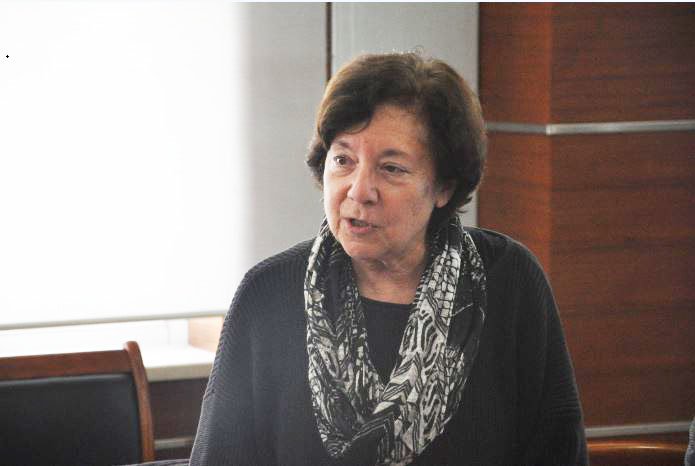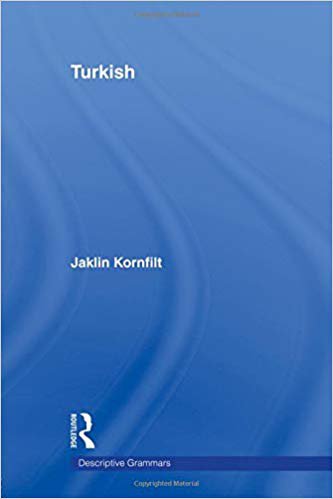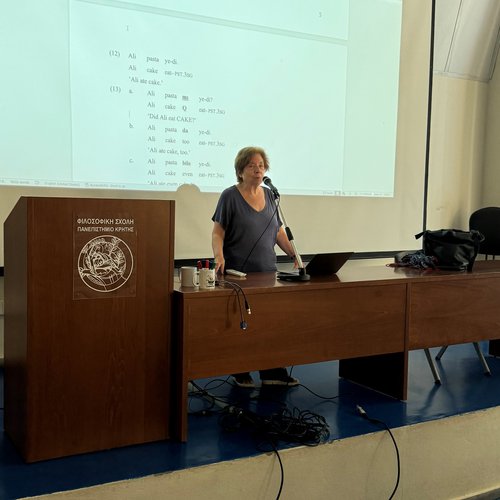Professor Shares Research in Turkish Linguistics with Students, Scholars Around the World
Turkish is one of 17 languages offered in A&S.

The American Council on the Teaching of Foreign Languages noted in 2019 that a large majority of employers consistently look for foreign language proficiency in candidates. Plus, being multilingual can confer lifelong earning benefits. With access to faculty like Jaklin Kornfilt, an expert in Turkish, A&S students have plenty of opportunities for developing proficiency in a variety of world languages.
We recently spoke with Prof. Kornfilt about her research and how she became interested in this field.
In the Beginning
Growing up in Istanbul, Professor of Linguistics Jaklin Kornfilt couldn’t help but be exposed to a variety of languages. At home, she spoke German and learned Yiddish from her grandmothers and Greek from her nanny. Living in such a multicultural city, she listened carefully as her mother spoke to various merchants in Turkish, Greek, Ladino (a variety of Spanish with borrowings from Hebrew) and Russian. She was fortunate to attend a primary school that taught English and later a German high school, where she spent an hour a day studying English, as well.
The various languages and dialects she became familiar with fascinated her, but it wasn’t until she was almost finished with an undergraduate degree in literature and translation at Heidelberg University in Germany that she truly discovered the field of linguistics. On a trip to visit a relative in Israel, she was fortunate to meet Professor Robert B. Lees, founder of the Department of Linguistics at Tel Aviv University. Noticing her knack for languages, he invited her to take his course in introductory linguistics. And, soon, she was hooked.
Lees became a mentor to Kornfilt. He had written a series of volumes teaching English to Turkish speakers and had written seminal articles and a monograph on Turkish linguistics at a time when little work on Turkish syntax existed. Kornfilt thought she might also be able to contribute to the field of Turkish linguistics, so Lees encouraged her to find a program in the U.S. where she could pursue her ambitions. This led her to earn a master’s degree and a Ph.D. in theoretical linguistics from Harvard University.
A 40-Year Career of Research and Teaching
In 1983, she joined the faculty of the Department of Languages, Literature and Linguistics at Syracuse University’s College of Arts and Sciences. And, for the past 40 years, she has continued to teach linguistics and conduct her research, as well as publish and present around the world on her expertise in syntactic theory (sentence and phrasal structure), theoretically informed linguistic typology (classifying language according to structural features), and morphology (word structure) with a specific focus on the Turkic languages.

One of her many accomplishments is the publication of a book, “Turkish” (in the series “Descriptive Grammars” at Routledge), a comprehensive overview of the grammatical properties of the Turkish language. She also contributed a chapter for “The World’s Language Families” on the key linguistic features that make Turkic languages special. In addition, Kornfilt co-edited “Syntactic Theory and First Language Acquisition: Cross Linguistic Perspectives.” Kornfilt is currently editing a special journal issue on formal approaches to the Turkic languages. Her vast contributions to the field through other articles, journal reviews, lectures and presentations throughout her career are too numerous to count, but the impact of her work has been significant.
How does the Turkish language differ from English?
The Turkish language is a member of the Turkic language family. Some parts of its vocabulary come from Arabic and Persian, while some other parts have been borrowed from French, Italian, Greek, and English; the core of its vocabulary, however, is Turkic. While English has a syntactic system with a subject-verb-object order, Turkish has a system that follows the order of subject-object-verb, meaning the verb is most often found at the end of a sentence. Turkish has agglutinative morphology, where there is essentially a one-to-one correspondence between each unit of the word and a particular meaning or function. Its phonology uses vowel harmony with suffixes where vowels change depending on the vowels in the root part of the word. Turkish has eight basic vowels (a, e, ı, i, o, ö, u, ü), which can vary slightly, depending on their position in the word. In addition, the language permits fewer kinds of consonant clusters compared to those found in English. For example, /str/ (as in “strong”) or /sks/ (as in “masks”) are not possible consonant clusters in Turkish. It also uses a modified version of the Latin alphabet with additional diacritic marks (e.g., ç, ğ, ı, ö, ş), while English orthography uses the Latin alphabet without any modification.
Last year, Kornfilt received the prestigious Jean and Denis Sinor Faculty Fellowship from the University of Indiana Bloomington’s Hamilton Lugar School of Global and International Studies. The late Professor Denis Sinor was a pioneer in Central Eurasian studies, spending much of his career at UI Bloomington. This fellowship is awarded to those currently involved in outstanding research related to the languages, histories, religions and cultures in Asia and the Middle East. As a fellow, Kornfilt presented “How Abstract Can Borrowings Be in Linguistic Change?” as part of the Sinor Faculty Fellowship Lecture Series in April 2023.
Sharing Her Expertise Around the Globe
Kornfilt recently contributed her expertise at two major international summer schools. In early July, she participated as a speaker at the prestigious New York St. Petersburg Institute (NYI) Global Institute of Culture, Cognitive and Linguistic Studies, which focuses on underrepresented fields of study in relation to culture, society and language. NYI was held in St. Petersburg, Russia, from 2003 to 2020 but has since been moved online due to the pandemic and the Russia-Ukraine War. Still, it draws hundreds from around the world eager to hear experts like Kornfilt share their research, with 251 students attending from 59 countries just this year. At this summer school, she presented “Varieties of Silence in Turkish” as part of NYI’s Distinguished Linguist Lectures.
In generative approaches to syntactic structures, one of the basic assumptions is the existence of silent constituents. During her presentation, Kornfilt addressed the various types of silent categories in the Turkish language, as well as examples that show how silent elements can be distinguished from each other just as well as audible parts of the sentence can.

Later in July, Kornfilt traveled to Greece for the 6th Crete Summer School of Linguistics (CreteLing 2024), where she, along with colleagues Shigeru Miyagawa, professor of linguistics at Massachusetts Institute of Technology (M.I.T.), and Sergei Tatevosov, professor of linguistics at Moscow State University in Russia, taught a course on “Topics in the Morphosyntax and Semantics of the Altaic Languages.”
Their course addressed syntactic, morphological and semantic phenomena shared by many Altaic languages — which include Turkic, Mongolic and Tungusic, as well as (under a sometimes disputed theory) Korean, Japanese and Ainu — allowing the examination of underlying systems through comparative study. Some of the constructions in Altaic languages are not found in English or the Romance languages (Spanish, French, Italian, etc.), and vice versa. Research focused on Altaic languages opened up the opportunity to study questions that had not been addressed in theoretical linguistics previously.
As Kornfilt prepares to return to the College of Arts and Sciences when classes begin in the fall, she is also looking forward to another conference to be held at the University of Cyprus this October where she will speak on evidentials (ways for languages to express certainty or uncertainty). She has a special appreciation for faculty and students at that university, as she was awarded an honorary doctorate there in 2021 for her contributions to theoretical and Turkish linguistics.
“Teaching at CreteLing 2024 was a wonderful experience in many ways. To (co-)teach a course in an area of my expertise was a special treat. The students were highly motivated and very interested in the course content—something which is perhaps not surprising, given that they had chosen to spend a part of their precious summer at a labor-intensive summer school. This summer’s iteration of CreteLing had 205 participants from 34 different countries,” says Kornfilt. “A particular plus of CreteLing is also the opportunity to visit the classes of colleagues and to learn from them, and I am happy to say that I was able to make use of that opportunity.”
Featured
Jaklin Kornfilt Professor, Linguistics and Turkish Program Coordinator
Media Contact
Caroline K. Reff
